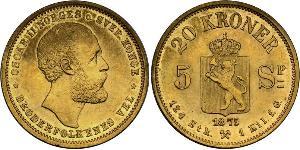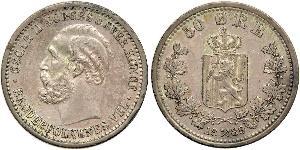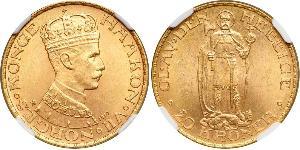20 Krone (Venduta per $1100.0)
1875, Norway, Oscar II. Gold 5 Specie Daler / 20 Kroner. None Better! NGC MS-66!
Mint Year: 1875
Mint Place: Kongsberg
Denomination: 20 Kroner / 5 Specie Daler
Reference: Friedberg 15 ($1150 in UNC!), KM-348. R!
Condition: Certified and graded by NGC as MS-66 (none better!)
Material: Gold (.900)
Diameter: 22mm
Weight: 8.96gm
Obverse: Head of Oscar II as King of Sweden and Norway right.
Legend: OSCAR II NORGES o. SVER. KONGE * BRODERFOLKENES VEL *
Reverse: Crowned shield of Norway, flanked by Specie Daler value (5-Sp). Dater (1875) above mint mark of Kongsberg (crossed hammers).
Legend: 20 KRONER / 5 - Sp / 124 Stk. (privy mark: crossed hammers) 1 Kil. f. G.
Oscar II (21 January 1829 – 8 December 1907), baptised Oscar Fredrik, was King of Sweden from 1872 until his death and King of Norway from 1872 until 1905. The third son of King Oscar I of Sweden and Josephine of Leuchtenberg, he was a descendant of Gustav I of Sweden through his mother.
At his birth in Stockholm, Oscar Fredrik was created Duke of Östergötland. He entered the navy at the age of eleven, and was appointed junior lieutenant in July 1845. Later he studied at Uppsala University, where he distinguished himself in mathematics. On 13 December 1848, he was made an honorary member of the Royal Swedish Academy of Sciences.
On 6 June 1857 he married in Wiesbaden-Biebrich, Germany, Princess Sophia Wilhelmina, youngest daughter of Duke William of Nassau.
From 1859, when his father died, he was first in line to the Swedish throne after his oldest brother King Charles, who then had no male heirs (his son had died in infancy in 1854). His middle brother Gustaf had died in 1852.
He succeeded his brother Charles XV / IV on 18 September 1872, and was crowned as king of Norway in the Nidaros Cathedral in Trondheim on 18 July 1873. At the accession he adopted as his motto Brödrafolkens väl / Broderfolkenes Vel ("The Welfare of the Brother Peoples"). While the King and the Royal Court resided mostly in Sweden, Oscar made the effort of learning to be fluent in Norwegian and from the very beginning he realized the essential difficulties in the maintenance of the union between the two countries.
The political events which led up to the peaceful dissolution of the union between Norway and Sweden in 1905 could hardly have been attained but for the tact and patience of the king himself. He was dethroned on 7 June 1905 by the Norwegian Parliament and renounced the Norwegian throne on 26 October. He declined, indeed, to permit any prince of his house to become king of Norway, but better relations between the two countries were restored before his death, which occurred in Stockholm on 8 December 1907.
His acute intelligence and his aloofness from the dynastic considerations affecting most European sovereigns gave the king considerable weight as an arbitrator in international questions. At the request of the United Kingdom, Germany and the United States in 1889 he appointed the chief justice of Samoa, and he was again called in to arbitrate in Samoan affairs in 1899.
In 1897 he was empowered to appoint a fifth arbitrator if necessary in the Venezuelan dispute, and he was called in to act as umpire in the Anglo-American arbitration treaty that was quashed by the United States Senate. He won many friends in the United Kingdom by his outspoken and generous support of Britain at the time of the Second Boer War (1899–1902), expressed in a declaration printed in The Times of the 2 May 1900, when continental opinion was almost universally hostile.
He was the 1,027th Knight of the Order of the Golden Fleece in Spain and the 774th Knight of the Order of the Garter in 1881.
During his time as King, the Office of Prime Minister was instituted in 1876. Louis De Geer became the first head of government in Sweden with this title. The most known and powerful first minister of the Crown during the reign of Oscar was the conservative estate-owner Erik Gustaf Boström . He served as Prime Minister between 1891 -1900 and from 1902 to 1905. He became during this time, very trusted by Oscar, who had much difficulty approving of some one else as Prime Minister. Gradually, Boström was given free hands by Oscar to select his own ministers without much regal involvement. It was an arrangement ( unintentially by both the King and Boström ) that furthered the road to parliamentarism.

|
Postato da:
anonymous 2014-01-29 |
|
||
|
||
|
||
|
||
|
||
1 Pice Africa orientale Bronzo
il gruppo ha 7 monete / 5 prezzi
⇑




 Deutsch
Deutsch Русский
Русский Українська
Українська English
English Italiano
Italiano Français
Français Español
Español 汉语
汉语














